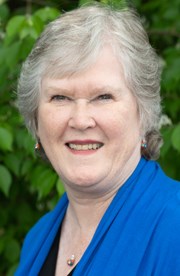VOL. 42 | NO. 19 | Friday, May 11, 2018
Better options available for those who want to ‘age in place’
By Linda Bryant
The vast majority of people who are retirement age or older want to live in their homes as long as possible, a concept that’s widely known as “aging in place.”
But aging in place can also mean you need outside help to live comfortably and safely in your home. Furthermore, it’s not always in your best interests to remain at home, no matter how much you long to live out your days in familiar surroundings.
How do we talk to aging parents about the realities and dangers of staying at home once their health is failing? How do we convince them to hire a part-time caregiver to help with daily tasks that have become overwhelming or even dangerous?
Or how we persuade them to downsize to a smaller space whether it’s moving into an independent living community or from a large four-bedroom home to a snug and manageable one-bedroom apartment in a walkable community?
Industry professionals, family members and other experienced caregivers who’ve traversed the terrain of the often unpredictable and heart-rending duties of caregiving say one of the best things you can do is to start having conversations about potential changes with an aging family member sooner rather than later.
It is worth noting that loved ones with memory loss may not be fully aware of their limitations and remain adamant about staying at home. No amount of rational thinking or negotiation is really going to get them to change their mind about moving. What do you do in this frustrating – and frighteningly dangerous – situation?
Why aging people resist change

Chamberlain
“Once you move out of your own home you begin to give up independence,” says Caroline Chamberlain, a board member of the Council on Aging of Middle Tennessee and retired social worker.
“There are some changes around important things [changes in routine, amount of personal possessions, neighborhood etc.], but the independence issue is really key, and it’s where I see the struggle usually begins.
“Think about it. Once you move into a residential program you are not going to have everything you want just as you want it,” Chamberlain adds. “Meals can be a big thing. Even if you have wonderful meals and you have choices, you don’t get to choose to have your favorite foods when you want them.”
Chamberlain, 73, who has been a caregiver for her mother, mother-in-law, daughter-in-law, and another set of in-laws prior to that, is also aging and making decisions about what she’s going to do about her living situation as time progresses.
She points out that there are often deeper unconscious issues that contribute to an elder feeling resistant to moving and changing day-to-day life as they know it.
“When you move out of your own home at some level you are actually moving towards death,” she explains.

Smith
“It can be very subtle, and I don’t know that it’s necessarily on people’s minds as they move into situations such as assisted living, but I think it’s often a factor.”
Grace Smith, executive director of the Council on Aging of Middle Tennessee, says she’s begun conversations surrounding tough decisions about aging with her own parents, even though they aren’t at the point of needing to move.
“I have been trying to have conversations with them about them selling the house and downsizing to something more manageable where they are able to keep up,” Smith adds.
“They are not ready yet, but we have started having the conversation, and that’s what I think is so important. It might take a year or two for something to change but at least we are talking about it.”
If a family is close-knit, siblings and other caregivers can arrange a meeting and tell parents how much better everyone would be if changes in a senior’s living situation were made at some point. But it shouldn’t be treated like an intervention or foregone conclusion.
Industry experts recommend allowing everyone involved to discuss their concerns and anxieties about a senior’s situation and a potential move.
But what happens when the aging person is in totally denial, completely resistant to any change that could actually improve their quality of life and potentially extend their life?
Smith notes third parties often make headway where family fails and that enlisting a social worker, mediator or physician — even a pastor or trusted family friend — to state the case for making a move can be an effective strategy.
Chamberlain says Smith is onto something with her advice.
“My mother-in-law ended up in assisted living because she broke a shoulder and she really needed more rehab,” she says. “It was easier for the rehab people to tell her she couldn’t go back home instead of us saying it to her.
“Of course, she didn’t want to hear it, she wanted to go home, but it wasn’t suitable for her to live at home anymore.
“After she got into assisted living we saw how much her nutrition improved, how much she got involved with new activities. She did finally make an adjustment and make friends.”
Staying at home, but needing help
Many seniors who don’t necessarily need to move to assisted living can benefit from getting help from a home health assistant who comes to their residence to help with anything from washing the dishes to sorting pills to shopping.
People often resist getting this kind of assistance, too.
Like Chamberlain and Smith, Elizabeth Moss founder and chief care officer of Caregivers by WholeCare, recommends early communication about making the decision to begin with.
“These days, it is more prevalent that families wait for a crisis before calling, so parents really don’t have any options other than having someone come into their home unless they want to move,” Moss says. “It’s too bad that families wait so long, as they could have prevented the crisis with proper planning.
“When parents are resistant to having ‘a stranger’ come into their home, we coach the adult children on potential talking points to have a conversation about starting care,” Moss continues.
Moss adds she believes that having some level of home health assistance can often prevent a crisis and can save money.
“Costs are much lower when care begins early for minimal care needs,’’ she says. “This allows a caregiver to provide a level of support that maximizes the individual’s independence and therefore pushes out the need for full-time care, if it’s needed at all.
“The costs are pushed out as well since a crisis is prevented, and potentially, there is no hospitalization,” Moss adds.
“If there is hospitalization, then care provided, even if only short term, can provide a level of support that again prevents a future crisis or readmission to the hospital. [Home health] care for older adult’s decreases readmissions overall hence costs to the family as well as the health care system.
“Medicare begins paying for some home care in January 2019 and that will be a game-changer for families. There will be parameters, however, it saves costs across the board when home care is included.”
Complicated, personal
Cindy Natsch, founder and owner of Let’s Get Moving!, says the act of moving from a beloved longtime residence can be a hard transition for people of any age.
For a senior citizen, it can feel not just uncomfortable but massively overwhelming and painful.
Let’s Get Moving! is a Brentwood-based company that helps clients, primarily 55-years-plus, with the process of relocation and many of its related issues.
“We help seniors relocate from where they live to where they are going,” Natsch explains. “We get them there in one piece.
“I can tell you one thing for sure: Moving can be exceedingly personal and complicated for a senior,” Natsch adds. “When someone is ready to leave their home after 30, 40, 50 years, the experience of moving becomes much different than moving when you are younger.”
Part of Natsch’s job can involve helping the client decide on what to keep, what to disperse to family members or give to Goodwill or other charities.
Natsch says that it’s often best to discuss difficult topics with seniors before they reach an advanced age and says there can be a big difference between having an awkward talk about moving with a parent when they are 65 compared to when they are in their late 80s or 90s.
“We are asking that individual to make all these big decisions [when they are at an advanced age] when all they want to do is be calm and not be stressed. For them the expectation [of staying in the same living situation] becomes better than the alternative.”
Natsch says in the future there will be a lot more public discussion about how to maneuver the nitty gritty aspects of aging.
“There’s a whole wealth of education that hasn’t occurred yet,” she notes.
“[As a society] we’re going to talk more about how to bring these topics up and really talk about them. There’s just not a common education platform, but the baby boomers are going to do that.”
Tim Howell, CEO of Senior Citizen’s Home Assistance Service, a Knoxville based non-profit agency that serves 20 counties in East Tennessee with home health and assisted living care, says making the decision to get in-home assistance or move to a more structured situation such as assisted living depends on the individual.
“If you are person who doesn’t have family help and you are just sitting in your home all day by yourself, I would recommend assisted living,” Howell points out.
“The people who come to our assisted living thrive. We manage their medicines, make sure they have food. We have activities for them, and we give them a purpose.
“They do things that are meaningful to other people, and they come out of their shell and thrive,” Howell continues. “We take them to Dollywood and to entertainment downtown. They write letters to servicemen overseas. We have a group that makes quilts for the NICU [neonatal intensive care unit] for babies that don’t make it. Family members get a quilt to bury their babies in.”
If an aging individual is relatively mobile, functions well cognitively and is backed up by family and community, then home health is often the first choice.
“If you are a person who has some type of a support system at home and people stopping in to see you, then stay at home and enjoy that until it gets too expensive and you need to think about going somewhere else,” Howell adds.
Howell is concerned about society’s ability to manage and serve the onslaught of aging citizens expected to flood the system as baby boomers age.
“I cannot hire enough caregivers to take care of the group we have now,” he acknowledges. “There’s going to be a huge caregiver shortage. It’s going to be harder and harder to find a good caregiver to take care of you. Hopefully, we will begin to address some of the underlying problems such as caregiver pay that are causing this issue.”
Moss, of Caregivers by WholeCare, says innovation in the industry is on its way and offers her business as an example of the industry adding services and options.
Moss started the company in 1997, and she says she was one of three home health providers in Nashville. Now there are 250.
She recently launched HouseShare Nashville, a housing service inspired by the ‘80s sitcom “The Golden Girls.”
“It’s a unique living situation for older adults who want companionship,
affordable housing and security,” she points out. “Residents enjoy apartments that have been modified for aging in place and community.
“They have a shared common space and access to WholeCare’s caregiving services including medication management, light cleaning, meal preparation and transportation.’’